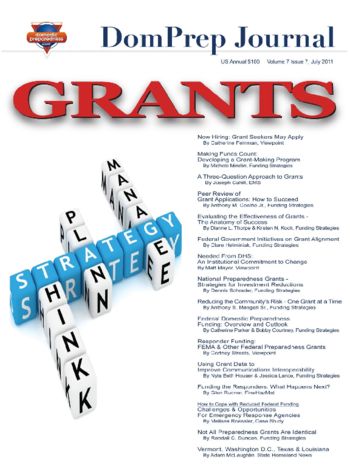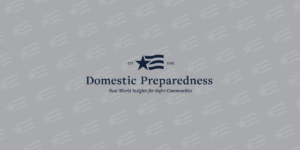

Reducing the Community’s Risk – One Grant at a Time
Anthony S. Mangeri
July 27, 2011
The guiding principle in emergency preparedness is virtually identical to one of the Golden Rules of good health: Prevention is much better, and almost always lower in cost, than recovery and rehabilitation. Which is why intelligent “grantsmanship” not only focuses first on the reduction of risks and vulnerabilities but also remembers that, somewhat like fingerprints, each grant program possesses “its own unique requirements and standards.”

Federal Government Initiatives on Grant Alignment
Clare Helminiak
July 27, 2011
A senior HHS executive, and world-class authority on medical-surge programs and requirements, discusses both the National Health Security Strategy the Whole Community FEMA approach – introduced earlier this year in that agency’s 2011-14 Strategic Plan – mandated to maintain “truly integrated and scalable public health…in an environment of increasingly constrained fiscal resources.” This is required reading for all grant applicants!

Using Grant Data to Improve Communications Interoperability
Nyla Beth Houser and Jessica Lance
July 27, 2011
One of the nation’s highest priorities in emergency preparedness has been, and will continue to be, the creation of vastly improved communications capabilities. Considerable progress has been made to date. But much more is needed, probably accompanied by additional funding at all levels of government: federal, state, and local.

How to Cope with Reduced Federal Funding: Challenges & Opportunities for Emergency Response Agencies
Melissa Roessler
July 27, 2011
Whatever the outcome of the current and long-running debt-limit controversy at the highest levels of government, it seems certain that the funding of emergency preparedness and national defense programs both will be cut to at least some extent. Here is some helpful advice that prudent planners might want to use to survive even the most serious cutbacks now being contemplated.

Now Hiring: Grant Seekers May Apply
Catherine L. Feinman
July 27, 2011
Read this “how to” article not only carefully but also constructively – and even a bit creatively
at times. Here are not only the ABCs of the grant-application process but also the What, Why, When,
Wherefore, and How questions most likely to be asked. Plus some friendly tips on key concepts, special
forms and special names, grant guidelines, funding/fiscal resources/finances, and reviewers and the
review process. Also, pre-planning, an all-inclusive approach, and a ton of hard work.

Not All Preparedness Grants Are Identical
Randall C. Duncan
July 26, 2011
A distinguished national officer of the International Association of Emergency Managers provides a short but concise list of helpful recommendations that grant-seekers at all levels of government, and in the private sector, might be well advised to follow in preparing, reviewing, submitting, and following up on their own grant applications.

National Preparedness Grants – Strategies for Investment Reductions
Dennis R. Schrader
July 20, 2011
The current debate over the national debt is a stern reminder that, even in politics and economics, what goes up will almost always also come down. The same is true for the funding provided for DHS/HHS preparedness grants – which are now starting to decline in both size and number, and likely to continue on that path for several more years.

Peer Review of Grant Applications: How to Succeed
Anthony M. Coelho, Jr.
July 20, 2011
Every writer, amateur or professional, wants to be pleased with his or her own “copy.” Every successful writer, though, knows it is much more important to please the readers. And/or the reviewers. And/or the political officials who make the final goo-go budget decisions.

Making Funds Count: Developing a Grant-Making Program
Michele Mindlin
July 20, 2011
There are many paths a community can take in search of a preparedness grant, but only one way to ensure that the search will be successful: Follow the Rules! This means advance planning, consulting, paying meticulous attention to all of the rules and regulations involved, and making sensible decisions every step of the way. The last requirement is the most important. Also the most difficult.

Federal Domestic Preparedness Funding: Overview and Outlook
Catherine Parker and Bobby Courtney
July 20, 2011
Before the 9/11 terrorist attacks, federal funding for preparedness grants was much lower than it should have been. Then it was increased exponentially. The nation is now better prepared than ever before to deal with mass-casualty incidents – and there are huge fiscal problems ahead. So major cutbacks in grant programs seem not just probable but inevitable.

